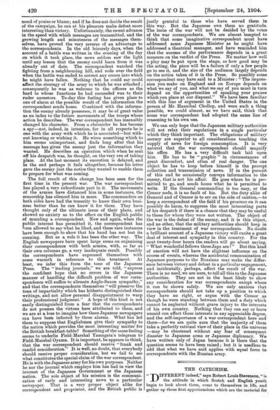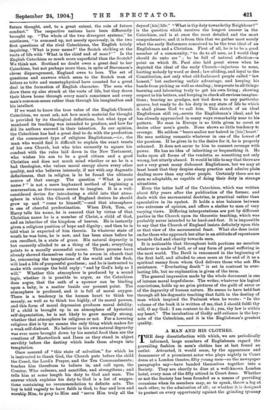future thought, and, to a great extent, the rule of
future conduct." The respective nations have been differently brought up. "The whole of the two divergent systems," he continues, "is summed up, not merely speciously, in the two first questions of the rival Catechisms, the English tritely inquiring, 'What is your name?' the Scotch striking at the roots of life with 'What is the chief end of man ? " Is the English Catechism so much more superficial than the Scotch?
We think not. Scotland no doubt owes a great deal to her Catechism, but not perhaps more than, in spite of Stevenson's clever disparagement, England owes to hers. The set of questions and answers which seem to the Scotch man of letters so trite and unmetaphysical have counted for a great deal in the formation of English character. The men who drew them up also struck at the roots of life, but they drove their blows home through every man's conscience and every man's common-sense rather than through his imagination and his intellect.
If we want to know the true value of the English Church Catechism, we must ask, not how much material for thought is provided by its theological definitions, but what type of manhood its teaching was intended to produce, and how far did its authors succeed in their intention. In our opinion,
the Catechism has had a great deal to do with the production of the commonest type of religious Englishman,—i.e., the man who would find it difficult to explain the exact tenets of his own Church, but who tries earnestly to square his conduct with the rules laid down in the New Testament, who wishes his son to be a good citizen and a good Christian and does not much mind whether or no he is a bad theologian, who values moral energy above every other quality, and who believes intensely, if not with any dogmatic definiteness, that in religion is to be found the ultimate source of that energy. The question "What is your name ? " is not a mere haphazard method of beginning a conversation, as Stevenson seems to imagine. It is a well- considered device for introducing a child into that atmo- sphere in which the Church of England desires he should grow up and "come to himself,"—and that atmosphere is one of cheerful predestination. When Dick, Toni, or Harry tells his name, he is assured that by virtue of that Christian name he is a member of Christ, a child of God, and an inheritor of the kingdom of heaven. He is instantly given a religious position of hope and dignity; and then he is told what is expected of him therein. In whatever state of wrath he was born, he is now, and has been since before he can recollect, in a state of grace. His natural depravity is but cursorily alluded to as a thing of the past; everything points to a morally successful career. Three persons have already showed themselves ready to be sworn in church that he, renouncing the temptations of the world and the flesh, will lead a life of purposeful goodness ; and he is instructed to make with courage the bold reply; "and by God's help so I will." Whether this atmosphere is produced by a sound logic, whether it is possible to argue, as the Catechism does argue, that the oath of a sponsor can be binding upon a baby, is a matter beside our present point. The atmosphere is produced, and it is full of moral oxygen. There is a tendency in the human heart to think too meanly, as well as to think too highly, of its moral powers, and this form of moral depression produces moral debility. If a child is brought up in an atmosphere of hysterical self-depreciation, he is not likely to grow morally strong, whether that atmosphere be religious or not. For a lowering religious diet is by no means the only thing which makes for a weak self-distrust. No believer in his own natural depravity was ever more brought down by his mental food than are the creations of Maeterlinck and Ibsen as they stand in abject servility before the destiny which leads them always into temptation.
Once assured of "this state of salvation," for which he is instructed to thank God, the Church puts before the child the Creed, the Lord's Prayer, and the Ten Commandments; teaches him therefrom to believe in, and call upon, the Creator, Who redeems, and sanctifies, and strengthens ; and tells him at some length his duty to God and man. The answer which explains his duty to God is a list of sugges- tions containing no recommendation to definite acts. The boy is told vaguely to have faith in God, to fear and love and worship Him, to pray to Him and "serve Him truly all the
days of [his] life." "What is thy duty towards thy Neighbour?" is the question which receives the longest answer in the Catechism, and is at once the most detailed and the most comprehensive; and it is from this that we gather most surely
what the early Reformers conceived to be the true ideal of an Englishman and a Christian. First of all, he is to be a good member of a community, "to do to all men, as I would they should do unto me " ; to be full of natural affection—a point on which St. Paul also laid great stress when he depicted the ideal of the early Church—injurious to none, hurting nobody by word or deed ; law-abiding, and loyal to the Constitution, not only what old-fashioned people called "law honest," but eschewing unfair advantage, and keeping his hands from picking as well as stealing ; temperate in all things.
learning and labouring truly to get his own living; showing respect to his betters, and keeping in cheek all envious imagina-
tions ; bearing no grudges, not tied down to any particulat groove, but ready to do his duty in any state of life to which it shall please God t" call him. This sketch of an ideal Englishman still rep.asents the Englishman's ideal, and he
has already approached in many ways remarkably near to his pattern. No man in Europe is so little given to covet or
desire other men's goods. None shows so little tendency t< revenge. He seldom "bears malice nor hatred in [his] heart.' He sees nothing romantic whatever in one of the lowest of the passions. If he gives in to the desire for it, he is properly ashamed. It does not occur to him to connect revenge with power. He has no idea of inheriting or bequeathing it. He looks upon all forms of the vendetta as something not only wrong, but utterly absurd. It would be idle toy that there are not a very great many dishonest Englishmen, but we may at least boast that they despise sharp practice and admire plain dealing more than any other people. Certainly there are no men so adaptable, so capable of doing their duty in strange situations.
Even the latter half of the Catechism, which was written about fifty years after the publication of the former, and deals with the sacramental doctrine, is practical rather than speculative in its upshot. It holds a nice balance between two extremes of opinion, and offers a shelter to men of very varying views. Differing interpretations are put by different parties in the Church upon its theoretic teaching, which was probably never intended to be hard-and-fast. It is impossible to say that the Church of England insists definitely upon this or that view of the sacramental feast. What she does insist on for those who approach her altar is an attitude of repentance towards God and charity towards men.
It is noticeable that throughout both portions no mention whatever is made of hell, or of any form of penal suffering in the next world. The Devil is renounced in the beginning of the first half, and alluded to once more at the end of it as a spiritual enemy from whom God delivers those who ask His assistance. "Everlasting death" is set in contrast to ever- lasting life, but no explanation is given of the term.
The general impression made by the whole document is one of intense moral hopefulness. The writer, whatever his logical
convictions, holds up no grim pictures of the guilt of error or of the depravity of human nature. He seems to have held fast through all his dogmatic teaching that faith in the destiny of man which inspired the Psalmist when he wrote; "In the volume of the book it is written of me, that I should fulfil thy will, 0 my God : I am content to do it ; yea, thy law is within my heart." The inculcation of Godly self-reliance is the key- note of the Catechism, and it is the Englishman's greatest quality.
A MAN AND HIS CLOTHES.







































 Previous page
Previous page